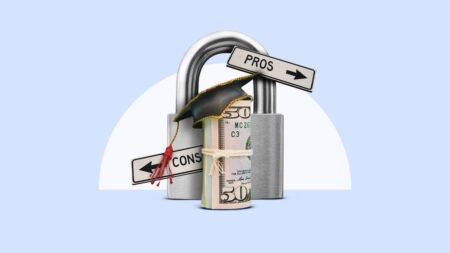PBNJ Productions/ Getty Images; Illustration by Austin Courregé/Bankrate
Key takeaways
- Several emergency loan types, including personal loans and credit card advances, can fund urgent needs quickly — in some cases within one business day.
- Payday loans and title loans should be used as a last resort since they come with steep borrowing costs and may be difficult to repay.
- If you have a bad credit score, you may be ineligible for less-expensive options like personal loans.
Knowing what types of emergency loans are available is critical to getting you the funds you need as soon as possible when you’re faced with an urgent expense. Most emergency loan types can provide you with quick access to cash, and some have long repayment terms to keep your payments low.
You’ll need to do your research though — some emergency loan rates are as high as 600% with full payment required in two weeks. Learning about emergency loans in advance may help you avoid taking on unaffordable debt in a crisis.
1. Personal loans
Personal loans offer a lump sum of cash. They are repaid in fixed monthly installments, with terms typically ranging between one and seven years. A key benefit of a personal loan, particularly with online and other fast lenders, is being able to get your cash as soon as the day you’re approved, which comes in handy in an emergency.
You can get personal loans at banks, credit unions and through online lenders. Excellent credit personal loan APRs may be below 7 percent, making them a cheaper alternative than credit cards. Bad credit loan APRs, on the other hand, may be over 30 percent — a hefty cost if you can’t pay them off ahead of schedule.
Who personal loans are better for
Borrowers with good credit (or a qualified cosigner) who need funds urgently, want lower interest rates than credit cards and prefer a fixed payoff schedule should consider a personal loan.

Pros
- Quick access to cash
- Typically doesn’t require collateral
- Lower interest rates, longer terms than other financing options

Cons
- Loan origination fees up to 12% of the loan amount
- Steep interest rates if you have poor credit
- Shorter repayment options than home equity options offer
2. Paycheck advances
Some employers offer paycheck advances, which allow you to receive upfront funds from your future earnings. Employers that offer this benefit may limit advance amounts and how often you can access them.
Third-party paycheck advance apps like Dave and Earnin also offer cash advances that you repay with your next paycheck. There is usually a fee for each advance. You may be charged a monthly subscription or maintenance fee to use the services.
Who paycheck advances are better for
Individuals who are paid on a regular schedule and need a small, short-term loan to cover an urgent financial need quickly would benefit most from these.
3. Credit card cash advances
Credit cards can be useful tools in an emergency when used responsibly. Many credit cards offer a cash advance feature that may allow you to access cash from an ATM or bank branch in a crunch. Since the cash advance is tied to your existing card’s credit limit, it doesn’t require an additional credit check.
While credit card cash advances may be a quick and easy funding choice, they typically have higher interest rates than your card’s standard variable APR. Plus, interest will also start to accrue right away on a cash advance, since there often isn’t a grace period.
Who credit card advances are better for
Those with active credit cards in good standing who need a quick small loan and who can afford the added fees and interest charges — or can realistically make a speedy repayment — will be the best fit for this type of emergency cash.

Pros
- Ability to avoid overdraft fees
- Low or no fees
- Useful app-based tools

Cons
- Not a long-term solution for financial distress
- Fine print can be difficult to parse
4. Payday loans
A payday loan is a type of instant, no-credit-check loan that lets you borrow up to about $500. Payday loans typically have to be repaid within two weeks or on your next payday.
This kind of emergency loan is generally considered extremely risky because standard payday lender APRs are about 400 percent, according to the Consumer Financial Protection Bureau. And they can be even higher. The short repayment period combined with high fees often makes it hard for people to repay what’s owed by the due date — and to escape a potential debt cycle.
Who payday loans are better for
Payday loans are the best fit for those with poor credit who can’t qualify for any other type of emergency loan and can pay the entire balance off before their next paycheck.

Pros
- Funds are accessible from any ATM
- Cash advance option may not require any application
- No credit check required for most advances

Cons
- Interest begins accruing immediately
- High rates and fees
- Limited borrowing amounts
5. Title loans
A title loan is another type of emergency loan that gets you fast access to cash secured by equity in your car. Also called a “pink slip loan,” this option allows you to borrow against 25 to 50 percent of the current market value of your vehicle.
Unlike some other emergency loan options, title loans are secured and require you to use your car for collateral. If you can’t repay the balance by the end of your loan term, the lender can seize your vehicle as repayment. That’s why it’s another last-resort option that’s best avoided, if possible.
Who title loans are better for
Title loans may be the only option for borrowers with poor credit but who own a free-and-clear vehicle. They should be a last resort in a dire situation, especially since you risk losing a source of transportation if you can’t pay the loan back.

Pros
- No credit check necessary
- Fast funding

Cons
- Extremely high APRs
- Very short repayment period
- Not a long-term solution
What can emergency loans be used for?
You can use an emergency loan for just about any unexpected expense you don’t have the cash to pay for. However, there are some urgent common scenarios that lead consumers to apply for an emergency loan.
- Car repairs. Significant repairs like an engine or bumper replacement can cost anywhere from a few hundred dollars to $10,000.
- Medical expenses. Even with health insurance coverage, the average U.S. employee has high deductibles: $2,085 for individuals, $4,063 for families, according to Kaiser Family Foundation. If the provider doesn’t offer any payment plans and demands immediate repayment, an emergency loan can help you avoid collection actions.
- Home repairs. The average household spent $978 on emergency home repairs in 2024, according to Angi’s 2024 State of Home Spending Report.
- Funeral costs. If an emergency loan is your only option to pay for a funeral, consider jointly applying for the loan with siblings or heirs, so the responsibility for the loan doesn’t fall only on you.
How to pick the right type of emergency loan
The right emergency loan for you depends on a number of factors, including how quickly you need the money and how much you need to borrow. If none of theseoptions fit, you may want to consider some alternatives to emergency loans before making your next move.
| Emergency loan type | Better for | A good fit for this type of emergency bill |
|---|---|---|
| Personal loan |
|
|
| Credit card cash advance |
|
|
| Payday loans |
|
|
| Title loans |
|
|
Can I get an emergency loan with a low income?
Yes, it is possible to get an emergency loan with a low income. If you have a good or better credit score, you may qualify for a smaller personal loan even with low income. Payday and title loans cater to low-income borrowers, as well, but often trap borrowers in an exploitative cycle of debt.
Bottom line
Most experts recommend an emergency fund with three to six months of expenses to avoid needing to finance an unforeseen expense. To avoid paying extra interest on loans for emergency bills, do your best to stash extra cash to build up your savings. (You might trim unnecessary expenses in your budget or pick up a side hustle to boost your income.)
If you must borrow in an urgent situation, keeping your credit in tip-top shape can help you get the lowest rates at the best terms.
Why we ask for feedback
Your feedback helps us improve our content and services. It takes less than a minute to
complete.
Your responses are anonymous and will only be used for improving our website.
Help us improve our content
Read the full article here

















